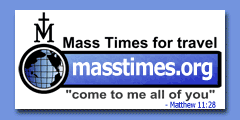
The Vatican

Good Counsel Homes
Catholic Places
Shrines, Basilicas, Cathedrals
Beautiful Holy Places
Catholic Gifts
Scapulars. Jewelry. Crucifixes
Stylish & Modest Fashion
Rosary Crusades
Rosary Crusade for America and The World

Catholic Parents
Online


Faithful Citizenship
Current News from:

American Life League
pro-life Americans


Catholic Pro-Life
Committee
|
Garvey: Six Proofs that Our Religious Liberty Is Threatened
Jun 19, 2012 -- Matthew Archbold -- cardinalnewmansociety.org
The Catholic University of America President John Garvey addressed the General Assembly of the United States Conference of Catholic Bishops in Atlanta, Ga., last week and offered six reasons to believe that religious liberty is under attack.
Garvey compared the current situation with regard to religious liberty in the U.S. to that of Tudor England, a time and place synonymous with religious persecution. "We are not the kind of violent and intolerant society Tudor England was," he said. "But in recent years the landscape of religious freedom has changed. Its purview has narrowed considerably. Let me give six examples."
1) EEOC - The Ministerial Exemption
Garvey pointed to a Supreme Court case called Hosanna-Tabor Church v. EEOC.
Hosanna Tabor is the name of an Evangelical Lutheran church.
The question in Hosanna-Tabor was whether a minister or teacher can sue a church under discrimination laws-the so-called "ministerial exception" that prevents courts from interfering in churches' relationships with employees who are responsible for religious activities. The plaintiff and the Equal Employment Opportunity Commission (EEOC) thought so.
"It's hard to imagine the government telling Lutherans whom they can hire as pastors. Could the EEOC order the Catholic Church to ordain women?" asked Garvey.
While the Supreme Court sided with Hosanna Tabor, Garvey said it is still "disappointing" that the executive branch "took such a dim view of the church's right. We might expect that the EEOC would side with the employee. But the Solicitor General of the United States argued that churches had no more rights in cases like this than would a labor union or a social club."
2) NLRB - Collective Bargaining Exemption
Garvey pointed to two recent cases in which National Labor Relations Board Regional Directors have held that Manhattan College in New York and St. Xavier University in Chicago are not Catholic institutions when it comes to exemption from the Wagner Act. The Board therefore allowed the adjunct faculty at each school to hold an election about forming a union. The colleges have both appealed to the full Board. (In fact, just yesterday, a similar decision was handed down from a regional NRLB office concerning Duquesne University.)
Garvey pointed out that the Supreme Court has previously held that the Wagner Act does not apply to lay teachers in Catholic high schools because it's their job to instruct students in the faith.
"Should we have a different rule for colleges? " Garvey asked. "The Board thinks we should, and its view is very much like the EEOC's." The Board maintains that Catholic teachers are exempt only if they engage in "indoctrination" and "proselytizing." College teachers and students live in an environment of academic freedom. Students don't have to attend mass. Schools may hire non-Catholic faculty. Boards of trustees are dominated by lay people, not clergy and members of religious orders. This openness "means (to the NLRB) that these institutions should be subject to regulation.
Garvey said the NLRB's view on this issue "shows a disappointing ignorance of, or disregard for, the way faith is communicated among intelligent adults. Faith is not an unthinking adherence that we come to only if we are forced, or swept along by a wave of mindless enthusiasm. Nor are the things we believe formulae we commit to memory, as fourth graders learn the catechism or ninth graders the axioms of geometry. Catholic universities bring their students and faculty to a better knowledge and love of God by appeals to the intellect and examples of virtue. These can't be persuasive unless they occur in an atmosphere of academic freedom. The government should not make a rule that exempts only those colleges that conform to its (fairly ill-informed) view of how religion should be taught. Better to leave that to the Church."
3) The HHS Mandate.
The mandate would, of course, force Catholic colleges and universities to provide coverage for surgical sterilizations and all FDA approved contraceptives (including those that may induce abortions early in pregnancy).
Garvey has been one of the most outstanding advocates of religious freedom, and CUA filed a lawsuit against the HHS mandate.
Garvey took on the Administration's narrow definition of what defines a religious institution. "At Catholic University we promote religious values in nearly everything we do," he said. "But we also teach physics, mechanical engineering, finance, and the literature of francophone Africa. Offering courses in those subjects, it seems, would disqualify us."
4) Conscience Protections
In 2008 HHS issued a rule to protect doctors and hospitals that counsel pregnant women from being sued for not presenting abortion as a medical alternative. Last spring HHS repealed the regulation putting doctors at risk for not counseling abortions.
5) HHS - Human Trafficking
The National Human Trafficking Victim Assistance Program now asks participating organizations to provide the "full range of reproductive services" to trafficking victims and unaccompanied minors in its cooperative agreements and government contracts, thus ruling out the USCCB's Migration and Refugee Services.
Migration and Refugee Services is free not to apply for grants. But the new arrangement is a departure from the more liberal approach we have traditionally taken in this area, where religious groups living the gospel have been welcome to help, Garvey noted. "Now, they will have to violate their own conscientious obligations in order to take part."
6) D.C. City Council - Gay "Marriage"
When the District of Columbia began considering a same-sex "marriage" law in November 2009, the Archdiocese of Washington asked for an exemption from rules that would force it to support gay "marriage" by doing such things as paying spousal insurance benefits and placing foster children with same-sex couples. The City Council refused.
"One Council member referred to the Church as 'childish.' Another said he would rather end the city's relationship with the Church than give in to its request," said Garvey. "When the law went into effect the Archdiocese had to close its 80-year-old foster care program. And it announced that it would have to stop providing spousal insurance benefits to all new employees, gay and straight."
Religious liberty these days is given a lot less scope than in the past. It protects priests but not teachers, Loyola but not St. Xavier, religious orders but not hospitals. Religious organizations like schools, hospitals, and Catholic Charities provide the public with valuable services. The government lets them do this work, but it is blind to their religious dimension. The problem with this way of parsing the work of religious institutions is that they do their work because of their religious beliefs. Catholic Charities does adoptions because the gospel tells us to care for the weak and vulnerable. Catholic universities exist because the gospel tells us to teach all nations. Migration and Refugee Services lives out the teachings of the Sermon on the Mount and Matthew 25. This is the heart of the Christian religion. Serving others - not just Catholics; all others - is not just a recommendation. It's a requirement.
Source: http://blog.cardinalnewmansociety.org/2012/06/19/garvey-six-proofs-that-our-religious-liberty-is-threatened/
Abortion is not Health Care
|
|






